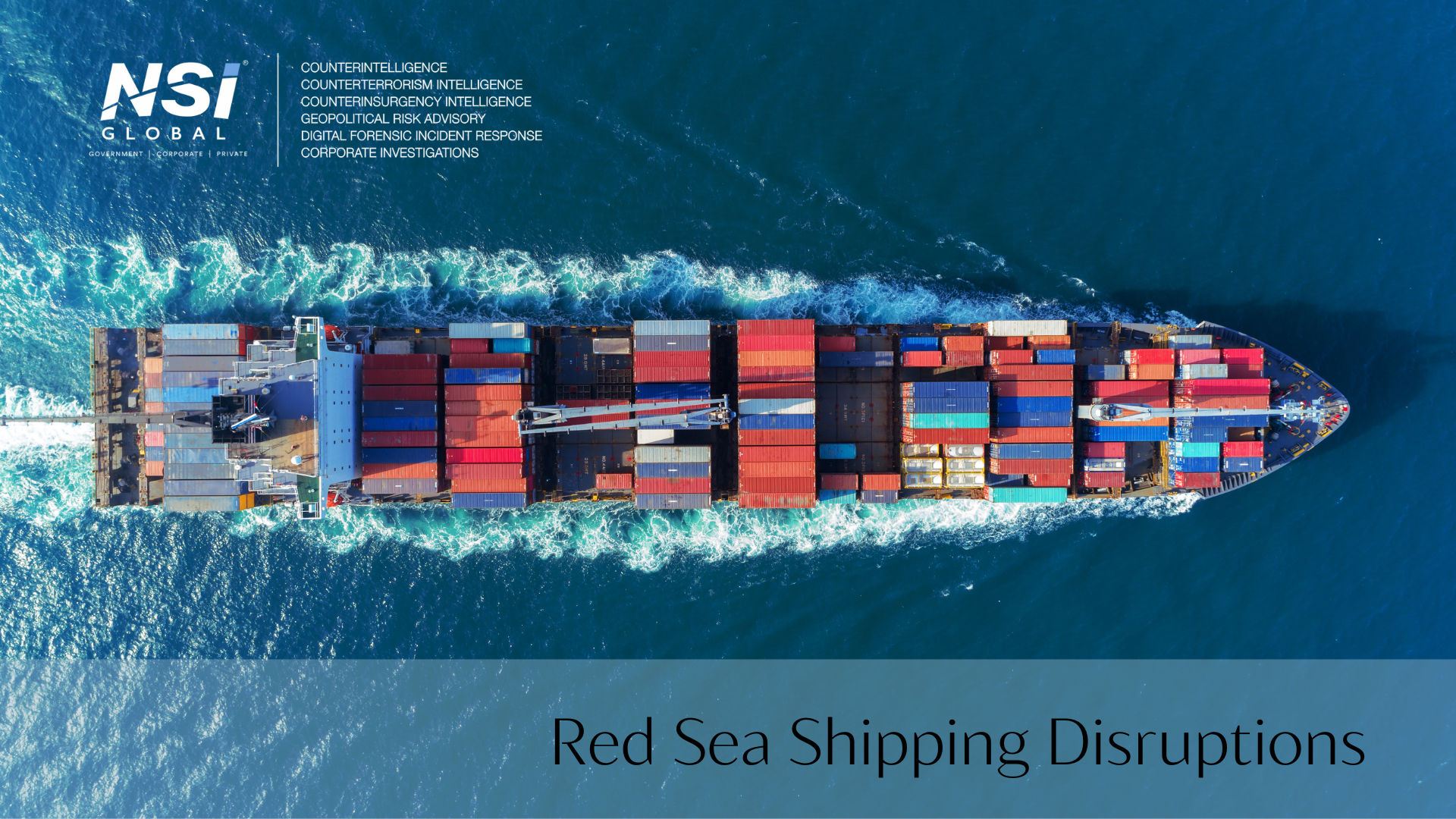Overview:
- Piracy and Maritime Terrorism resurges.
- Drone threats increase around the Red Sea due to conflict in Israel/Palestine.
- Risks to industries such as Shipping, Logistics, Energy.
- International trade disruptions, delays and increased costs.
- NSI Global’s intelligence services provide near real-time actionable intelligence and risk assessments.
The seas in the Middle East, especially the Red Sea, Gulf of Aden, and Arabian Sea, are facing a dangerous mix of increasing piracy and drone attacks due to regional instability. Industries that rely on these waterways, such as shipping, logistics, and energy, are now grappling with significant security risks. NSI Global, a leader in counterintelligence and security risk mitigation, offers solutions to protect people, ships, and cargo while traversing these risky waters.
Is Piracy Making a Comeback in the Middle East?
Yes, it certainly is. After a period of relative calm, piracy attempts in the region nearly doubled in 2021, and the trend is not showing any signs of slowing down. Somalia, a historical hotspot, remains a breeding ground for piracy due to:
- Economic hardship: Young men, facing severe economic challenges, resort to piracy as a desperate means of survival.
- Political instability: Fragile states like Yemen provide safe havens for criminal networks to operate freely.
- Tech-savvy pirates: Pirates now possess sophisticated weaponry, ranging from firearms to RPGs and even explosive-rigged drones, giving them the capability to overpower merchant vessels.
Beyond Pirates: The Emerging Drone Threat
The escalation of the Israel-Gaza conflict has introduced a chilling new element – drone attacks on commercial ships. An Iranian-backed drone strike on an oil tanker in July 2022 was a wake-up call, exposing critical infrastructure and global energy supplies to potential disruptions. Houthi rebels are also using drones and missiles to target shipping routes in the Red Sea during the current conflict in Israel/Palestine. This new maritime terror threat raises concerns about:
- Widespread disruptions: Attacks on key maritime nodes can severely disrupt global supply chains and international trade.
- Escalation of regional conflict: Non-state actors using drones against commercial vessels add a new dimension to regional tensions.
- Hijacking of Vessels: Successful attacks allow groups to use vessels for ransom or propaganda purposes.
Industries in the Crosshairs: Who Suffers When the Seas Get Rough?
The consequences of piracy and drone attacks are far-reaching. Industries that heavily depend on maritime trade in the Middle East, including shipping and logistics, the energy sector, and international trade, face:
- Shipping and logistics: Delays, ships being forced to go around the Cape of Good Hope in South Africa, increased insurance costs, and reputational damage are just some of the consequences for shipping companies.
- Energy sector: Attacks on oil tankers and other energy infrastructure can lead to price fluctuations and disrupt global energy supplies.
- International trade: Disruptions to maritime routes have a cascading effect on global supply chains and international trade.
Securing the Seas: Proactive Measures for a Safer Future
Given the increasing threats, organizations in the region must take proactive measures to ensure robust security. Here’s how:
- Intelligence is key: NSI Global’s team of experienced analysts provides crucial threat intelligence on piracy trends, drone activity, and other maritime security threats.
- Invest in intelligence: Accessing real-time threat intelligence is crucial for informed decision-making and risk mitigation. NSI Global offers comprehensive intelligence reports tailored to the specific needs of maritime organizations.
- Implement robust security protocols: Establish strict security protocols on vessels, including heightened vigilance, proper watchkeeping procedures, and defensive measures against drone attacks, to deter criminal activity.
- Engage with local authorities: Building strong relationships with local authorities and coast guards in high-risk areas can facilitate timely responses to incidents and enhance overall security cooperation.
- Conduct security risk assessments: Regularly assess security risks of vessels, routes, and operations to identify vulnerabilities and implement appropriate mitigation strategies. NSI Global’s security risk master planning services can provide a comprehensive roadmap for improving maritime security.
NSI Global is Your Partner in Maritime Security
With decades of experience in counterintelligence and security risk mitigation, NSI Global understands the complexities of the global maritime security landscape. Through its comprehensive suite of intelligence, risk management, geopolitical risk advisory, and security consulting services, NSI Global empowers clients to:
- Make informed decisions: Data-driven intelligence enables informed route planning, security protocols, and mitigation strategies.
- Minimise disruption to operations: Proactive measures help ensure the uninterrupted flow of goods and personnel.
- Protect your bottom line: Robust security reduces financial losses from delays, insurance claims, and reputational damage.
Don’t let the rising tide of piracy and drone attacks threaten your operations. Contact NSI Global today to learn how our expertise can help you navigate your critical trade routes and secure your maritime operations.




